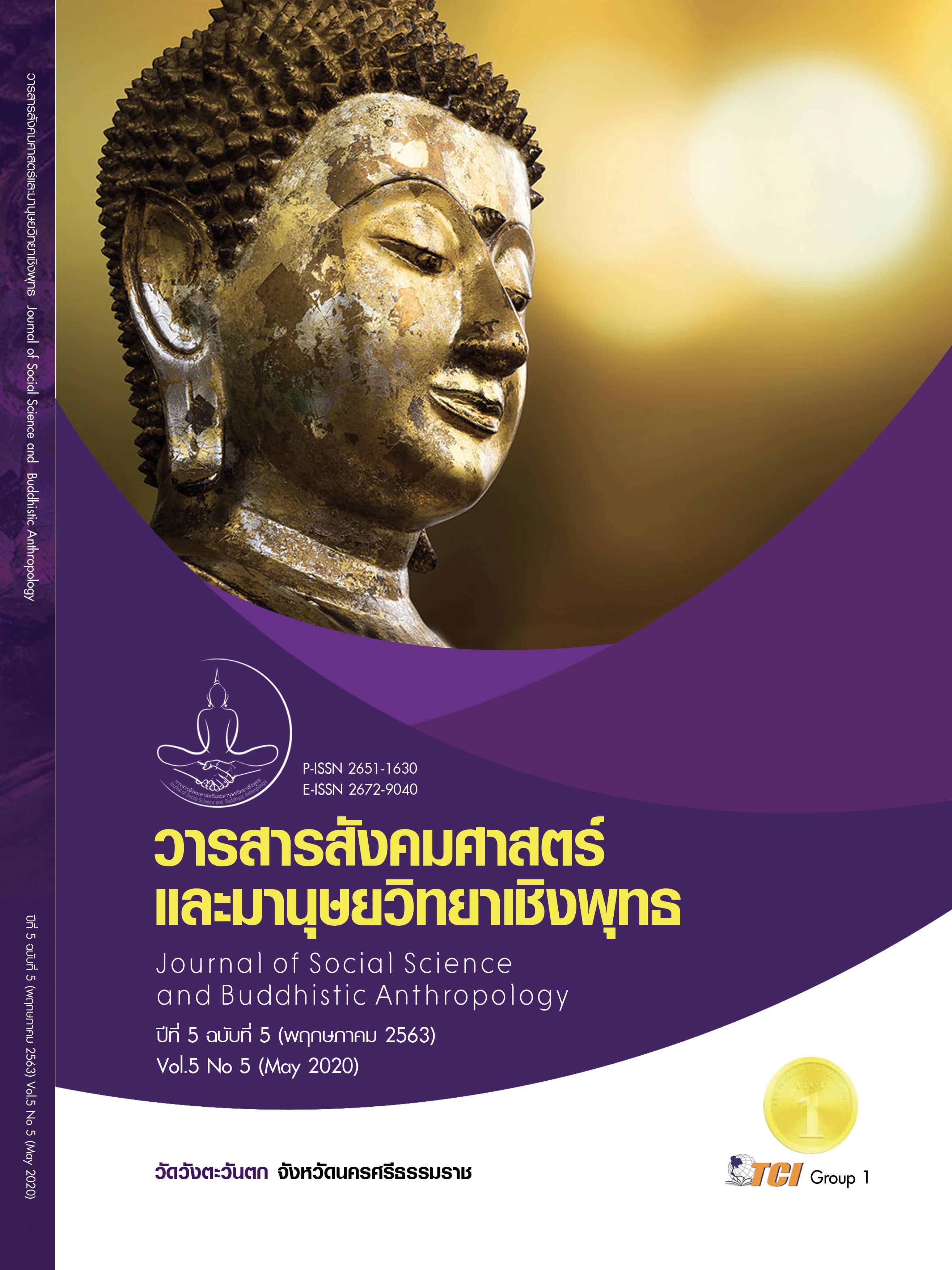THE APPLICATION OF BUDDHIST ETHICS ON THE BELIEF IN THE SHRINE OF BUDDHISTS IN THAI SOCIETY
Keywords:
Application, Buddhist Ethics, Belief, Shrine, Buddhists In Thai SocietyAbstract
The objectives of this article were: 1) to study the concept of the belief in the shrine of Buddhists in Thai society. 2) to study the Buddhist ethics on belief and conduct of Buddhist. 3) to apply the Buddhist ethics in the shrine of Buddhists in Thai society. 4) to create a new body of knowledge and model of Buddhists in Thai society regarding other beliefs. This was a qualitative one based documentary research upon the analytic, appreciative and applicative approach so as to lead to the creativity of new body of knowledge in philosophy and religion. The results of research were found as follows: the Buddhists in Thai society believe in the shrine as being a holy thing of each home, gods who safeguard persons within the home to stay calm, being prosperous, staying safe from all dangers. Buddhist ethics is the principle regarding the way of common action of being good and evil of each human. The Buddhist ethics can be applied in living of heedfulness as the case of angels who cultivate good and be happily in Happy States. The Buddhists must cultivate themselves the good conduct leading to the blissful states of existence. To worship the shrine is the means to lead the end of Buddhist ethics is that the Buddhist standpoint is based on the faith of the Karma Law connecting with the concept of Rebirth leading to the cessation of suffering. As for the creativity of new body of knowledge on “The Application of Buddhist Ethics on the Belief in the Shrine of Buddhists in Thai Society” is the six qualifications of existence for enhancing the life quality consisting of existences of knowledge, virtue, determination, development, useful conduct and sublimity.
References
จารุวรรณ ธรรมวัตร. (2540). คติชาวบ้านอีสาน. กรุงเทพมหานคร: อักษรวัฒนา.
บัวกนก วัชรปรีดา. (2544). การผสมผสานทางวัฒนธรรม: กรณีศึกษาบ้านท่ามะไฟหวาน ตำบลท่ามะไฟหวาน อำเภอแก้งคร้อง จังหวัดชัยภูมิ. ใน วิทยานิพนธ์ศิลปศาสตรมหาบัณฑิต สาขาวิชาวัฒนธรรมศึกษา . มหาวิทยาลัยมหาสารคาม.
บุญมี แท่นแก้ว. (2547). ประเพณีและพิธีกรรมพระพุทธศาสนา. กรุงเทพมหานคร: โอเดียน สโตร์.
เบญจรัชต์ เมืองไทย. (2543). พิธีทรงเจ้า: พิธีกรรมกับโครงสร้างสังคมที่บ้านหนองขาว. ใน วิทยานิพนธ์ศิลปศาสตรมหาบัณฑิต สาขาวิชาสังคมวิทยา. มหาวิทยาลัยศิลปากร.
พระมหาปรีชา จนฺทธมฺโม (อุดมกัน). (2558). ศึกษาความเชื่อการบวงสรวงเทวดาของชุมชนโคกหัวภู ตำบลเหล่าต่างคำ อำเภอโพนพิสัย จังหวัดหนองคาย. ใน วิทยานิพนธ์พุทธศาสตรมหาบัณฑิต สาขาวิชาพระพุทธศาสนา. มหาวิทยาลัยมหาจุฬาลงกรณราชวิทยาลัย.
พระเสาร์คำ ธมฺมวโร (ธิหล้า). (2560). การวิเคราะห์หลักจริยธรรมของเทวดาที่มีต่อสังคมไทย . ใน วิทยานิพนธ์พุทธศาสตรมหาบัณฑิต สาขาวิชาพระพุทธศาสนา. มหาวิทยาลัย มหาจุฬาลงกรณราชวิทยาลัย.
พระอาทิตย์ อินฺทภตฺติโก (อินทรภักดี). ( 2561). ศึกษาวิเคราะห์ความเชื่อเกี่ยวกับพระภูมิเจ้าที่ของชาวไทยพุทธในตำบลคลองแห อำเภอหาดใหญ่ จังหวัดสงขลา. ใน วิทยานิพนธ์พุทธศาสตรมหาบัณฑิต สาขาวิชาพระพุทธศาสนา. มหาวิทยาลัยมหาจุฬาลงกรณราชวิทยาลัย.
มหาจุฬาลงกรณราชวิทยาลัย. (2539). พระไตรปิฎกภาษาไทย ฉบับมหาจุฬาลงกรณราชวิทยาลัย . กรุงเทพมหานคร: มหาจุฬาลงกรณราชวิทยาลัย.
สมภาร พรมทา. (2543). มนุษย์กับศาสนา. กรุงเทพมหานคร: โรงพิมพ์จุฬาลงกรณ์มหาวิทยาลัย.
สมภาร พรมทา. (2549). ศาสนาเพื่อการพัฒนาคุณภาพชีวิต. กรุงเทพมหานคร: สำนักงานคณะกรรมการการอุดมศึกษา.
หลวงปู่สุข. (2547). พิธีตั้งศาลพระภูมิ พิธีทำบุญบ้านและทำบุญขึ้นบ้านใหม่. กรุงเทพมหานคร: โรงพิมพ์เลี่ยงเชียง.
อมรา พงศาพิชญ์. (2541). วัฒนธรรม ศาสนา และชาติพันธุ์: วิเคราะห์สังคมไทยแนวมานุษยวิทยา. (พิมพ์ครั้งที่ 5). กรุงเทพมหานคร: สำนักพิมพ์แห่งจุฬาลงกรณ์มหาวิทยาลัย.
อรุณรัตน์ จันทะลือ. (2549). การสืบทอดความเชื่อเรื่องผีปู่ตาของเยาวชน ชาติพันธุ์โส้ บ้านกอก ตำบลผาเสวย อำเภอสมเด็จ จังหวัดกาฬสินธุ์. ใน วิทยานิพนธ์ศิลปศาสตรมหาบัณฑิต สาขาวิชาวัฒนธรรมศึกษา. มหาวิทยาลัยมหาสารคาม.









